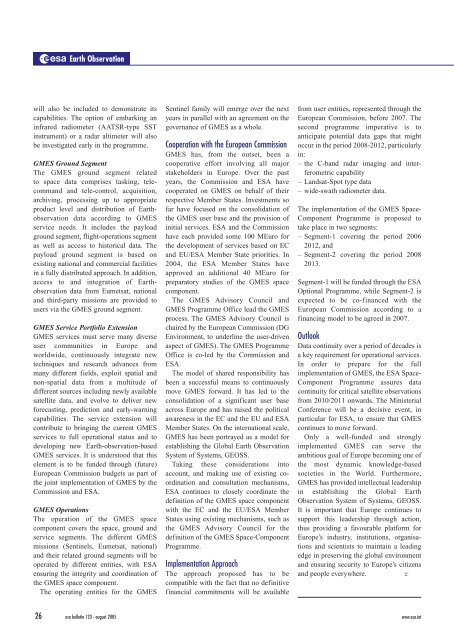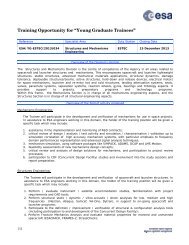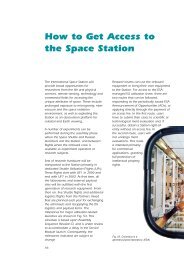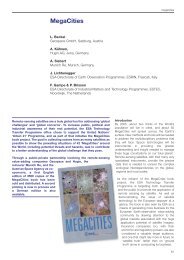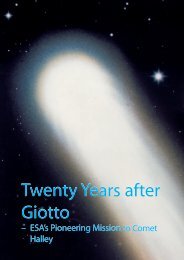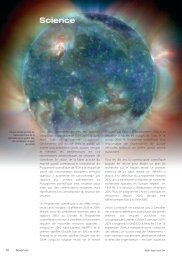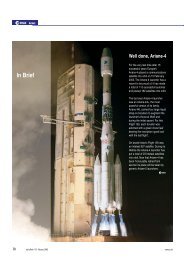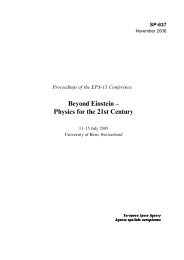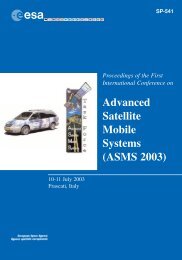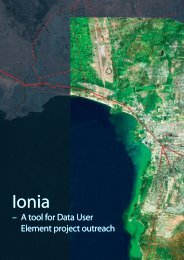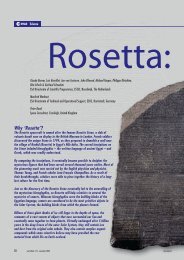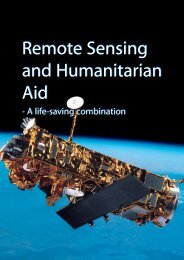Global Monitoring for Environment and Security Global ... - ESA
Global Monitoring for Environment and Security Global ... - ESA
Global Monitoring for Environment and Security Global ... - ESA
You also want an ePaper? Increase the reach of your titles
YUMPU automatically turns print PDFs into web optimized ePapers that Google loves.
Earth Observation<br />
will also be included to demonstrate its<br />
capabilities. The option of embarking an<br />
infrared radiometer (AATSR-type SST<br />
instrument) or a radar altimeter will also<br />
be investigated early in the programme.<br />
GMES Ground Segment<br />
The GMES ground segment related<br />
to space data comprises tasking, telecomm<strong>and</strong><br />
<strong>and</strong> tele-control, acquisition,<br />
archiving, processing up to appropriate<br />
product level <strong>and</strong> distribution of Earthobservation<br />
data according to GMES<br />
service needs. It includes the payload<br />
ground segment, flight-operations segment<br />
as well as access to historical data. The<br />
payload ground segment is based on<br />
existing national <strong>and</strong> commercial facilities<br />
in a fully distributed approach. In addition,<br />
access to <strong>and</strong> integration of Earthobservation<br />
data from Eumetsat, national<br />
<strong>and</strong> third-party missions are provided to<br />
users via the GMES ground segment.<br />
GMES Service Portfolio Extension<br />
GMES services must serve many diverse<br />
user communities in Europe <strong>and</strong><br />
worldwide, continuously integrate new<br />
techniques <strong>and</strong> research advances from<br />
many different fields, exploit spatial <strong>and</strong><br />
non-spatial data from a multitude of<br />
different sources including newly available<br />
satellite data, <strong>and</strong> evolve to deliver new<br />
<strong>for</strong>ecasting, prediction <strong>and</strong> early-warning<br />
capabilities. The service extension will<br />
contribute to bringing the current GMES<br />
services to full operational status <strong>and</strong> to<br />
developing new Earth-observation-based<br />
GMES services. It is understood that this<br />
element is to be funded through (future)<br />
European Commission budgets as part of<br />
the joint implementation of GMES by the<br />
Commission <strong>and</strong> <strong>ESA</strong>.<br />
GMES Operations<br />
The operation of the GMES space<br />
component covers the space, ground <strong>and</strong><br />
service segments. The different GMES<br />
missions (Sentinels, Eumetsat, national)<br />
<strong>and</strong> their related ground segments will be<br />
operated by different entities, with <strong>ESA</strong><br />
ensuring the integrity <strong>and</strong> coordination of<br />
the GMES space component.<br />
The operating entities <strong>for</strong> the GMES<br />
Sentinel family will emerge over the next<br />
years in parallel with an agreement on the<br />
governance of GMES as a whole.<br />
Cooperation with the European Commission<br />
GMES has, from the outset, been a<br />
cooperative ef<strong>for</strong>t involving all major<br />
stakeholders in Europe. Over the past<br />
years, the Commission <strong>and</strong> <strong>ESA</strong> have<br />
cooperated on GMES on behalf of their<br />
respective Member States. Investments so<br />
far have focused on the consolidation of<br />
the GMES user base <strong>and</strong> the provision of<br />
initial services. <strong>ESA</strong> <strong>and</strong> the Commission<br />
have each provided some 100 MEuro <strong>for</strong><br />
the development of services based on EC<br />
<strong>and</strong> EU/<strong>ESA</strong> Member State priorities. In<br />
2004, the <strong>ESA</strong> Member States have<br />
approved an additional 40 MEuro <strong>for</strong><br />
preparatory studies of the GMES space<br />
component.<br />
The GMES Advisory Council <strong>and</strong><br />
GMES Programme Office lead the GMES<br />
process. The GMES Advisory Council is<br />
chaired by the European Commission (DG<br />
<strong>Environment</strong>, to underline the user-driven<br />
aspect of GMES). The GMES Programme<br />
Office is co-led by the Commission <strong>and</strong><br />
<strong>ESA</strong>.<br />
The model of shared responsibility has<br />
been a successful means to continuously<br />
move GMES <strong>for</strong>ward. It has led to the<br />
consolidation of a significant user base<br />
across Europe <strong>and</strong> has raised the political<br />
awareness in the EC <strong>and</strong> the EU <strong>and</strong> <strong>ESA</strong><br />
Member States. On the international scale,<br />
GMES has been portrayed as a model <strong>for</strong><br />
establishing the <strong>Global</strong> Earth Observation<br />
System of Systems, GEOSS.<br />
Taking these considerations into<br />
account, <strong>and</strong> making use of existing coordination<br />
<strong>and</strong> consultation mechanisms,<br />
<strong>ESA</strong> continues to closely coordinate the<br />
definition of the GMES space component<br />
with the EC <strong>and</strong> the EU/<strong>ESA</strong> Member<br />
States using existing mechanisms, such as<br />
the GMES Advisory Council <strong>for</strong> the<br />
definition of the GMES Space-Component<br />
Programme.<br />
Implementation Approach<br />
The approach proposed has to be<br />
compatible with the fact that no definitive<br />
financial commitments will be available<br />
from user entities, represented through the<br />
European Commission, be<strong>for</strong>e 2007. The<br />
second programme imperative is to<br />
anticipate potential data gaps that might<br />
occur in the period 2008-2012, particularly<br />
in:<br />
– the C-b<strong>and</strong> radar imaging <strong>and</strong> interferometric<br />
capability<br />
– L<strong>and</strong>sat-Spot type data<br />
– wide-swath radiometer data.<br />
The implementation of the GMES Space-<br />
Component Programme is proposed to<br />
take place in two segments:<br />
– Segment-1 covering the period 2006<br />
2012, <strong>and</strong><br />
– Segment-2 covering the period 2008<br />
2013.<br />
Segment-1 will be funded through the <strong>ESA</strong><br />
Optional Programme, while Segment-2 is<br />
expected to be co-financed with the<br />
European Commission according to a<br />
financing model to be agreed in 2007.<br />
Outlook<br />
Data continuity over a period of decades is<br />
a key requirement <strong>for</strong> operational services.<br />
In order to prepare <strong>for</strong> the full<br />
implementation of GMES, the <strong>ESA</strong> Space-<br />
Component Programme assures data<br />
continuity <strong>for</strong> critical satellite observations<br />
from 2010/2011 onwards. The Ministerial<br />
Conference will be a decisive event, in<br />
particular <strong>for</strong> <strong>ESA</strong>, to ensure that GMES<br />
continues to move <strong>for</strong>ward.<br />
Only a well-funded <strong>and</strong> strongly<br />
implemented GMES can serve the<br />
ambitious goal of Europe becoming one of<br />
the most dynamic knowledge-based<br />
societies in the World. Furthermore,<br />
GMES has provided intellectual leadership<br />
in establishing the <strong>Global</strong> Earth<br />
Observation System of Systems, GEOSS.<br />
It is important that Europe continues to<br />
support this leadership through action,<br />
thus providing a favourable plat<strong>for</strong>m <strong>for</strong><br />
Europe’s industry, institutions, organisations<br />
<strong>and</strong> scientists to maintain a leading<br />
edge in preserving the global environment<br />
<strong>and</strong> ensuring security to Europe’s citizens<br />
<strong>and</strong> people everywhere. r<br />
26 esa bulletin 123 - august 2005 www.esa.int


